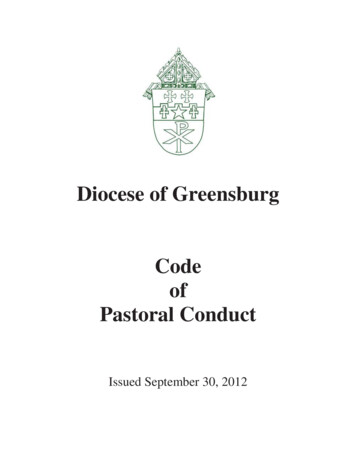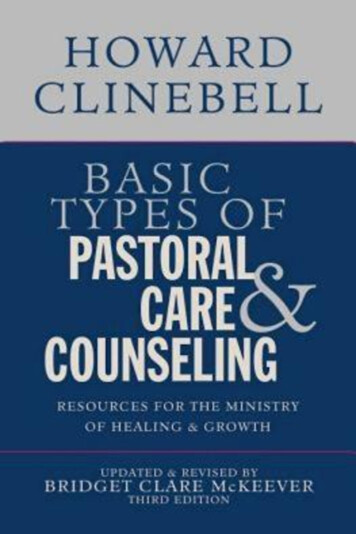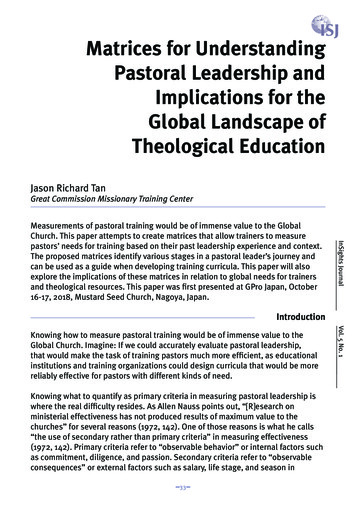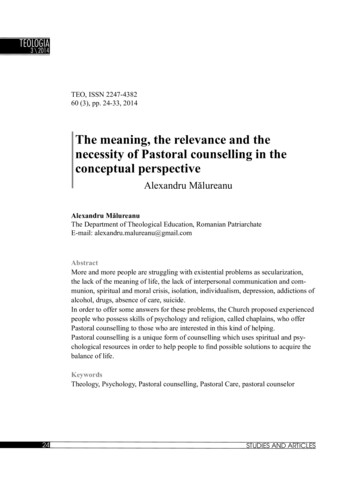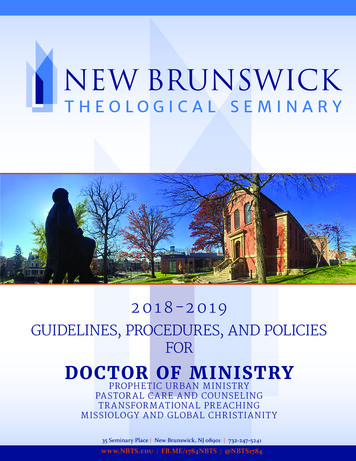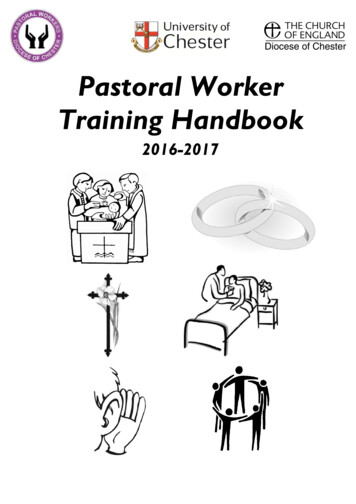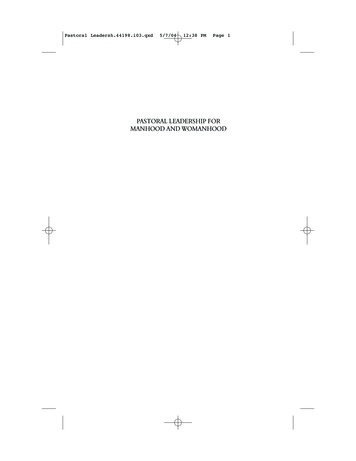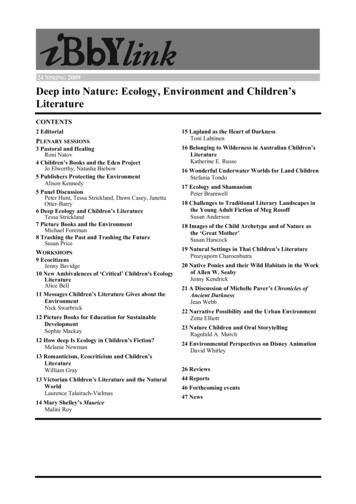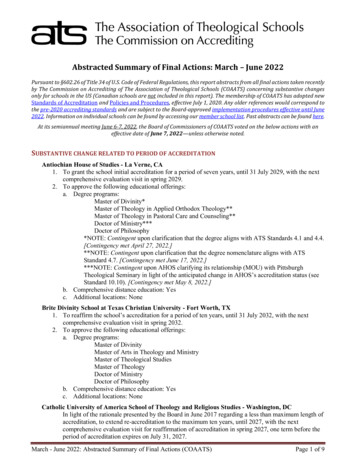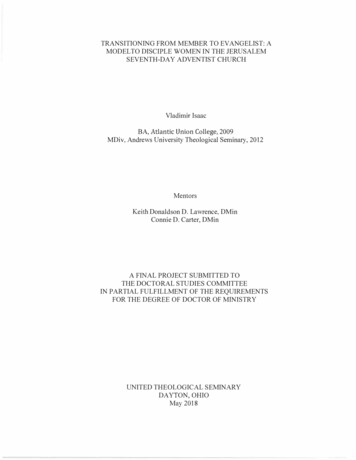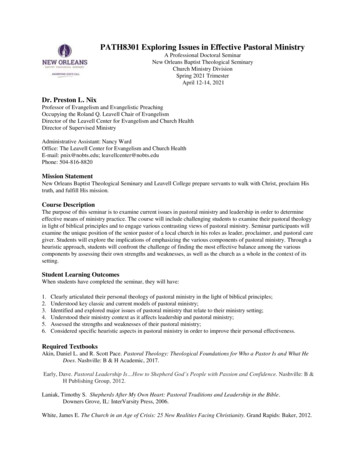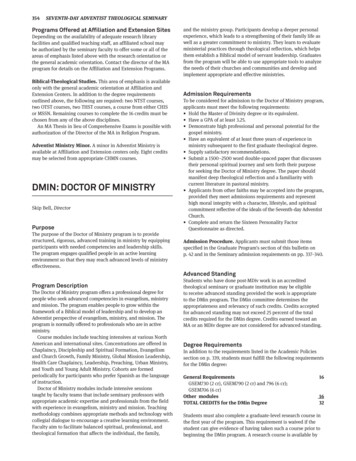
Transcription
354SEVENTH-DAY ADVENTIST THEOLOGICAL SEMINARYPrograms Offered at Affiliation and Extension SitesDepending on the availability of adequate research libraryfacilities and qualified teaching staff, an affiliated school maybe authorized by the seminary faculty to offer some or all of theareas of emphasis listed above with the research orientation orthe general academic orientation. Contact the director of the MAprogram for details on the Affiliation and Extension Programs.Biblical-Theological Studies. This area of emphasis is availableonly with the general academic orientation at Affiliation andExtension Centers. In addition to the degree requirementsoutlined above, the following are required: two NTST courses,two OTST courses, two THST courses, a course from either CHISor MSSN. Remaining courses to complete the 16 credits must bechosen from any of the above disciplines.An MA Thesis in lieu of Comprehensive Exams is possible withauthorization of the Director of the MA in Religion Program.Adventist Ministry Minor. A minor in Adventist Ministry isavailable at Affiliation and Extension centers only. Eight creditsmay be selected from appropriate CHMN courses.dmin: Doctor of ministrySkip Bell, DirectorPurposeThe purpose of the Doctor of Ministry program is to providestructured, rigorous, advanced training in ministry by equippingparticipants with needed competencies and leadership skills.The program engages qualified people in an active learningenvironment so that they may reach advanced levels of ministryeffectiveness.and the ministry group. Participants develop a deeper personalexperience, which leads to a strengthening of their family life aswell as a greater commitment to ministry. They learn to evaluateministerial practices through theological reflection, which helpsthem establish a Biblical model of servant leadership. Graduatesfrom the program will be able to use appropriate tools to analyzethe needs of their churches and communities and develop andimplement appropriate and effective ministries.Admission RequirementsTo be considered for admission to the Doctor of Ministry program,applicants must meet the following requirements: Hold the Master of Divinity degree or its equivalent. Have a GPA of at least 3.25. Demonstrate high professional and personal potential for thegospel ministry. Have an equivalent of at least three years of experience inministry subsequent to the first graduate theological degree. Supply satisfactory recommendations. Submit a 1500–2500 word double-spaced paper that discussestheir personal spiritual journey and sets forth their purposefor seeking the Doctor of Ministry degree. The paper shouldmanifest deep theological reflection and a familiarity withcurrent literature in pastoral ministry. Applicants from other faiths may be accepted into the program,provided they meet admissions requirements and representhigh moral integrity with a character, lifestyle, and spiritualcommitment reflective of the ideals of the Seventh-day AdventistChurch. Complete and return the Sixteen Personality FactorQuestionnaire as directed.Admission Procedure. Applicants must submit those itemsspecified in the Graduate Program's section of this bulletin onp. 42 and in the Seminary admission requirements on pp. 337–340.Advanced StandingProgram DescriptionThe Doctor of Ministry program offers a professional degree forpeople who seek advanced competencies in evangelism, ministryand mission. The program enables people to grow within theframework of a Biblical model of leadership and to develop anAdventist perspective of evangelism, ministry, and mission. Theprogram is normally offered to professionals who are in activeministry.Course modules include teaching intensives at various NorthAmerican and international sites. Concentrations are offered inChaplaincy, Discipleship and Spiritual Formation, Evangelismand Church Growth, Family Ministry, Global Mission Leadership,Health Care Chaplaincy, Leadership, Preaching, Urban Ministry,and Youth and Young Adult Ministry. Cohorts are formedperiodically for participants who prefer Spanish as the languageof instruction.Doctor of Ministry modules include intensive sessionstaught by faculty teams that include seminary professors withappropriate academic expertise and professionals from the fieldwith experience in evangelism, ministry and mission. Teachingmethodology combines appropriate methods and technology withcollegial dialogue to encourage a creative learning environment.Faculty aim to facilitate balanced spiritual, professional, andtheological formation that affects the individual, the family,Students who have done post-MDiv work in an accreditedtheological seminary or graduate institution may be eligibleto receive advanced standing provided the work is appropriateto the DMin program. The DMin committee determines theappropriateness and relevancy of such credits. Credits acceptedfor advanced standing may not exceed 25 percent of the totalcredits required for the DMin degree. Credits earned toward anMA or an MDiv degree are not considered for advanced standing.Degree RequirementsIn addition to the requirements listed in the Academic Policiessection on p. 339, students must fulfill the following requirementsfor the DMin degree:General RequirementsGSEM730 (2 cr), GSEM790 (2 cr) and 796 (6 cr);GSEM706 (6 cr)Other modulesTOTAL CREDITS for the DMin Degree161632Students must also complete a graduate-level research course inthe first year of the program. This requirement is waived if thestudent can give evidence of having taken such a course prior tobeginning the DMin program. A research course is available by
DMIN: DOCTOR OF MINISTRY355distance education for DMin students to meet this prerequisite.Participants in the Family Ministry concentration satisfy thisrequirement with RLED776-01 Topics: Program Evaluation.during the GSEM790 intensive. It can also be obtained from theDoctor of Ministry Web site: www.doctorofministry.com, or theDMin office.Financial PlansAcademic Supervision. The director of the DMin program actsas curriculum supervisor. The project adviser and a second readerare chosen by the student in consultation with the programdirector. Students should work closely with these persons and theDMin project coach to complete the project.Financial plans are available to assist NAD employees,international students, cohort groups, and others. Contact theDMin office for further information.Modes of DeliveryIn order to make the program accessible to church professionals,the professor contact portions of course modules are offered asintensives on-campus and at off-campus locations.Residency RequirementsIn order to fulfill residency requirements, extension students musttake GSEM706 (6 cr) and GSEM790 at the Andrews Universitycampus or at any other Andrews ATS-Association of TheologicalSchools-approved site.Project Requirements Students should take GSEM790 (2 cr) in preparation for theirproject. A statement explaining the philosophy of a Doctor ofMinistry project, including guidelines for its development andpreparation, is provided when GSEM790 is taken. A projectproposal must be submitted and accepted. The project, which should address a problem or issuedirectly relevant to the ministry of the contemporary church,is developed and implemented in an in-ministry situation.The approach of the project is normally developmental withformative evaluation. The project should be developed in closeconsultation with the student's adviser. Regulations governingthe style and format of project documents are found inAndrews University Standards for Written Work. During the third and fourth years of the curricular program,candidates must register for GSEM796. If the project is still inprogress after this time, the student must register for GSEM788DMin Project Continuation (0 cr) and pay the doctoral projectcontinuation fee for each additional semester. When students are unable to demonstrate adequate writingabilities they will be required to hire an editor at their expense. Students must pass an oral defense of the project designedto test the candidate's ability to integrate learning and thepractice of ministry. The defense must be successfully completedno later than four weeks prior to graduation. In certain cases, a dissertation may be substituted for a projectwith permission from the Doctor of Ministry office.Time Limits. DMin students must complete all courses andmodules and successfully defend the project within six years fromthe time they begin course work. In special circumstances and uponwritten request, extensions may be granted for no more than anadditional year. Tuition for continuation equal to one doctoralcredit will be charged per semester in an extension year. Whenparticipants are dropped due to time limits course module creditsare preserved, but project/dissertation courses must be retaken atcost should readmission be granted.Project Process. For a detailed outline of the DMin projectprocess, students should see the Guidelines for the Doctor ofMinistry Project. A copy of this document is provided to studentsCourses and ModulesSee inside front cover for symbol code.(Credits)All modules include teaching intensives which are generally twoweeks in length.The ProjectGSEM730Field Research for MinistryDevelops capacity to utilize information in the practice ofministry—congregational studies, systems analysis, programevaluation, structured experiments, surveys, focus groups,participant observer, action-research and communityassessments. Introduces research process, ethics and designapplied to practical issues of leading a congregation or faithbased organization.(2)GSEM788DMin Project Continuation(0)GSEM790(2)DMin Project SeminarParticipants receive assistance in forming their DMin projectproposal, and orientation to issues in successful completion ofthe project dissertation. Areas of focus include a literature review,research techniques, writing standards, developing an effectivework plan for completion of their project, and other projectrelated topics. Prerequisite: a graduate-level research methodscourse.GSEM796(2–6)DMin ProjectA DMin project is a professional project that integratestheological reflection, scholarly research and practical ministry.The project contributes to the enhancement of ministry in thechurch.GSEM789DMin Program Continuation(0)CHMN/MSSN/RLED797(1–8)Independent StudyAvailable to students by permission of the program committee.Repeatable. A minimum of one meeting per month with thesupervising professor is generally required. May be graded S/U.Required ModuleGSEM706(6)Spiritual and Theological Foundations for MinistryThis is a foundational module required of all DMin students. Themodule builds the spiritual and theological basis from which
356SEVENTH-DAY ADVENTIST THEOLOGICAL SEMINARYthe practice of ministry and mission grows and seeks to lead thestudent into a self reflection and examination of life and belief.Chaplaincy ConcentrationCHMN747(6)Christian LeadershipThis module investigates principles, challenges, and practices ofChristian leadership, emphasizing issues that make leadershipin the context of church, education and non-profit serviceorganizations unique. Participants examine leadership theoryand literature, consider a theology of leadership, and buildthe foundation for leadership development in the context ofprofessional ministry.CHMN775(5)Foundations of Chaplaincy MinistryThis module examines the biblical and theological foundationsfor chaplaincy ministry. Participants investigate the history anddevelopment of chaplaincy ministry, and its role and functionwithin the mission and life of the church and community. Issuesin ethics are explored to advance professional development.Emphasis on personal spiritual formation continues.of the church and wider community. A corporate life of outreachand ministry to others through loving and maturing relationshipswill be developed.Evangelism and Church Growth ConcentrationCHMN719(6)Perspectives on Mission and Church Growth StrategiesProvides reflection and practice in the following areas: 1) thecore value and centrality of evangelism in the mission and lifeof the local church; 2) ministry-embedded integration of theoryand practice within a biblical theology of mission; 3) creating aculture of year-around evangelism; 4) church growth principles;5) reaching secular people; and 6) church planting as evangelisticstrategy.CHMN767(5)Formation of Evangelistic StrategyProvides reflection and experience in contemporary personal,public and media evangelistic strategies as a basis for effectiveevangelistic leadership. Biblical and practical foundations forempowering people for ministry as well as factors and strategiesfor cell church growth are experienced. Prerequisite: CHMN719.CHMN785(5)Professional Formation in Chaplaincy MinistryThe primary emphasis in this module is the professionaldevelopment of the chaplain. Participants examine leadershipissues specific to chaplaincy, management, human development,group theory, and organizational theory. Specific modalitiesof ministry in the chaplaincy context will be examined anddeveloped. Emphasis on personal spiritual formation continues.CHMN789(5)The Missional ChurchThis module identifies and examines the characteristics ofthe missional church. Biblical faithfulness in discipleship andmission priority on the congregational level are further examined.Case studies of successful contemporary models for local churchevangelism are explored.Discipleship and Spiritual Formation ConcentrationEach summer two intensives in the Family Ministry Concentrationare offered. Prerequisite: EDPC520 Psychological DevelopmentLife Span or equivalent.CHMN705(6)Theological and Historical Perspectives on Spiritual GrowthExamines the biblical and theological basis for spiritual life,discipleship and Christian experience as well as how this theologyhas been understood and experienced in the history of thechurch and the lives of believers. Critiques contemporary forms ofspirituality to enable students to discern truth from counterfeit.CHMN707(6)The Personal Practice of Spiritual FormationCovers a historical view of those devotional practices outlined inScripture, Ellen White and significant devotional writers that leadto Christian formation. Provides a praxis model of reflection uponand engagement with, those spiritual practices and patterns oflife that define who we are as disciples of Jesus.CHMN708(5)Mentoring for Discipleship and Spiritual FormationThis course will equip participants for assisting in the Christianformation and discipling of others through spiritual mentoring. Itwill develop an understanding of how the age, temperament anddevelopmental stage of a mentoree helps to determine the mosteffective model for discipling.CHMN709(5)Constructs of Corporate Ministry for Discipleship andSpiritual FormationExplores constructs of corporate ministry that will enhancegrowth in Christian formation and discipleship within the contextFamily Ministry ConcentrationRLED720(1)Professional DevelopmentRepresents student initiatives for developing sustainable habits ofscholarship including such things as attendance at special-eventlectures, and professional conferences, reading professional orscholarly journals; and maintaining a vibrant spiritual life. DGwill be given until experiences are documented in the portfolio.Graded S/U.RLED755(3)Families in SocietyAn exploration of issues germane to family life education, andthe mission and methods of family ministry within a leadershipperspective.RLED757(3)Family Law and Public PolicyAn exploration of issues which identify social problems affectingfamilies and how family law and public policies relate to socialservices for children and families.RLED758(3)Internal Dynamics of FamiliesA study of family systems theory with applications to issues ininternal family dynamics and in congregational dynamics as afamily system.
DMIN: DOCTOR OF MINISTRYRLED759(3)Human SexualityAn understanding of, and skill development in, interpersonalrelationships and a study of human social conduct withemphasis on congregational life. Also studies the physiological,psychological, emotional, and social aspects of human sexualityand the Christian response to this God-given gift. Examinesmeasures for preventing clergy sexual misconduct.RLED779(3)Parenting Education and GuidanceExamines the changing roles and responsibilities of parents;child-rearing practices, including spiritual nurture of children;safety and protection for children; diverse parenting situations;decision making about parenthood. Develop skills in parentingeducation, integrating a Christocentric purview.Global Mission Leadership ConcentrationMSSN731, 732(4, 4)Cultural and Religious Analysis—I, IIUsing the tools of cultural, social, anthropological, and religiousanalysis, the specific context and challenges of mission will beanalyzed and described in depth as a basis for ministry. Thecourse content will be shaped to fit the local situation.357Leadership ConcentrationCHMN747(6)Christian LeadershipThis module investigates principles, challenges, and practices ofChristian leadership, emphasizing issues that make leadershipin the context of church, education, and non-profit serviceorganizations unique. Participants examine leadership theoryand literature, consider a theology of leadership, and buildthe foundation for leadership development in the context ofprofessional ministry.CHMN760(5)Advanced Leadership CompetenciesParticipants continue personal and theological reflectionwith integration of leadership principles. Systems thinking,organizational culture, human development theory, andecclesiology are investigated in the context of the church andleadership. The module also pursues further development andapplication of essential leadership practices. Practical focuson administrative skills is initiated. Prerequisite: CHMN747Leadership and Church Management.MSSN741, 742(4, 4)Mission Strategy Development—I, IIStudy of contemporary strategies of mission as a framework andfoundation for the development and practice of a ministry planwithin specific contexts. The role of leadership in this process is highlighted. Prerequisite: MSSN731, 732 Cultural and Religious Analysis.CHMN780(5)Leading and Managing the Church OrganizationLocal churches and denominational organizations presentchallenges in leadership, management, and administration.This module combines previous requirements of the Doctor ofMinistry leadership concentration and an informed foundationof biblical leadership to help participants excel in skills likestrategic planning, managing change, team building, resourcemanagement, communication, mentoring, and coaching.Health Care Chaplaincy ConcentrationPreaching ConcentrationCHMN786(6)Clinical Issues in Care and CounselingThis module covers instruction in theory and clinical skills withinthe context of spiritual care. It provides education in the following specialty areas: psychological and spiritual assessment, griefrecovery, trauma, conflict resolution, and specific processes of disease such as HIV/AIDs, cancer, disability, and mental health issues.CHMN716(6)The Preacher, the Audience, and the MessageParticipants will develop a personal, biblically-based theologyof preaching in the worship context. Use of scripture,communication theory, and cognitive psychology to connect withcontemporary audiences, and diverse preaching expressions,including the African-American context, will be examined.Includes advanced work in the area of hermeneutics, exposition,contextualization, and sermon design.CHMN787(5)Theory & Research in ChaplaincyThis module covers current research on spirituality and healthas well as the theological understanding of spiritual care withinthe clinical context. The theoretical framework for this module isbased on psychological, sociological, and theological literature.This module also explores methods that will enable participantsto have a better understanding of the lived experience of thepeople to whom they minister.CHMN788(5)Professional Practice in ChaplaincyThis module promotes integration within the institutional lifethrough professional interdisciplinary areas. It explores thevarious leadership roles and functions involved in chaplaincyand includes professional conduct, leadership ethics,interdisciplinary consultation, and interdepartmental relations.The issue of how to conduct workshops and organize supportgroups is also addressed in this module.CHMN748(5)Preaching the Literary Forms of the BibleExpository preaching from biblical literature, including historicalnarrative, NT epistles, and apocalyptic. Special attention will begiven to the skill of storytelling and how stories are processed bythe human mind. Includes collegial and inductive reflection onthe unique challenges and opportunities within epistolary andapocalyptic biblical texts.Urban Ministries ConcentrationCHMN769(5)Strategic Planning for Urban Community DevelopmentAn in-depth study of key biblical, theological and contemporarymodels of community-based ministry. Includes an emphasison strategic planning that leads to economic and communitydevelopment.
358SEVENTH-DAY ADVENTIST THEOLOGICAL SEMINARYCHMN776(5)Leadership and Urban Church ManagementThis course investigates principles, challenges, and practices ofChristian leadership with special emphasis on the urban context.It includes theological reflection, exploration of leadership roles,and practical insights.CHMN778(6)Church Growth and Discipleship in the Urban ChurchAn examination of principles for expanding the Kingdom of Godin the Urban context. The course aspires to help students developand assess church growth and disciple-making strategies for theurban church from a biblical perspective. A study of effectivehistorical and contemporary models is included.Youth and Young Adult Ministry ConcentrationCHMN720(6)Current Issues in Youth MinistryStudents study selected issues in youth and young adultministry, including adolescent development, inter-generationalrelationships, and the challenges of popular culture. They learnhow to build specialized approaches in youth ministry.CHMN721(5)Perspectives on Youth and Young Adult Ministry LeadershipStrategiesThis module will explore the various leadership roles andfunctions involved in youth and young adult ministry. It includes:youth and young adult ministry leadership principles, planningand leading major events, writing grant proposals, implementingchange, leadership in youth evangelism, developing peoplehelping skills, life cycle of a youth and young adult ministry.CHMN765(5)Advanced Youth and Young Adult MinistryBuilds on knowledge of youth and young adult ministry andadvances to a greater depth in such areas as: understanding youthculture, youth evangelism, small groups in youth and young adultministry, sexuality, music, camping, short-term missions, writinggrant proposals, risk management, contemporary worship, andreclaiming missing youth and young adults.Religious Education prepares pastor-teachers for leadershiproles in settings where religious, moral, and spiritual nurtureand growth are pri mary concerns. Areas of emphasis in ReligiousEducation include campus spiritual leadership, children’sministry, Christian formation and discipleship, family lifeeducation, theological curriculum and instruction, denominationalcertification for secondary religion, and other options customizedby the student in consultation with an advisor. The degrees areinterdisciplinary and offer students considerable flexibility.In addition to the area of emphasis, the core requirementsfocus on facili tating the development of the graduate as a Christian Apologist Pastor-Teacher Servant Leader Researcher-Evaluator Maturing Christian Lifelong ScholarEach of these roles includes a number of com petencies thatserve as guides to students in designing their programs of studyand choosing their courses. Students generally meet the com petencies by satisfactorily completing the core courses andemphasis area electives in the curriculum. A course plan isprepared by each student in consultation with his or her ReligiousEducation advisor. Well-planned choices help to ensure thatcompetencies are met at levels appropriate for the degree pursued.All course work is campus-based and supported by onlineresources. Where warranted, students may fulfill programcompetencies by portfolio presentation.Graduate Certificates in Religious EducationA graduate certificate program is a focused group of courseswith a coherent knowledge base in one field of specialization.Courses in the program are regular graduate courses that are fullytransferable into Religious Education graduate degree programsand other graduate programs where these courses are applicableto the curriculum.Religious Education currently offers two 12-credit graduatecertificate programs: Family Life Education and Campus SpiritualLeadership. The successful completion of a graduate certificateprogram is noted on the student's transcript.Admission and Time Limitreligious education, DirectorMissionThe Religious Education programs prepare men and women to fulfillthe teaching and discipling mandates of the gospel commission.ProgramsThe Religious Education programs offer studies leading to theMaster of Arts: Religious Education and the Doctor of Philosophy:Religious Education. Each graduate will have a biblical knowledgebase, an understanding of Christian spiritual formation andnurture, and pedagogical skills to serve in a specialized area ofteaching ministry for either the formal (school) or non-formal(church and family) setting.The same admission processes and standards are used ingraduate certificate programs as are used for master’s degreeprograms, except that the Graduate Record Exam (GRE) is notrequired. The time for completion of a certificate program shouldnot exceed five years from first enrollment.Delivery SystemCourses in the graduate certificate programs are offered assummer intensives on a two-year rotation. Each intensiverequires pre-campus and post-campus work. Pre-campus syllabiare posted on our Web site: www.andrews.edu/sem/reled/, inFebruary of each year. At least two courses are offered back-toback each summer, allowing a student to complete the sequenceover a two-summer period.Graduate Certificate: Family Life EducationThe Graduate Certificate in the Family Life Education program isdesigned for pastors, family ministries directors, and lay leaders
DMIN: current literature in pastoral ministry.DoCToR oF MINISTRY Skip Bell, Director Purpose The purpose of the Doctor of Ministry program is to provide structured, rigorous, advanced training in ministry by equipping participants with needed competencies and leadership skills. The program engages qualified people in an active learning
